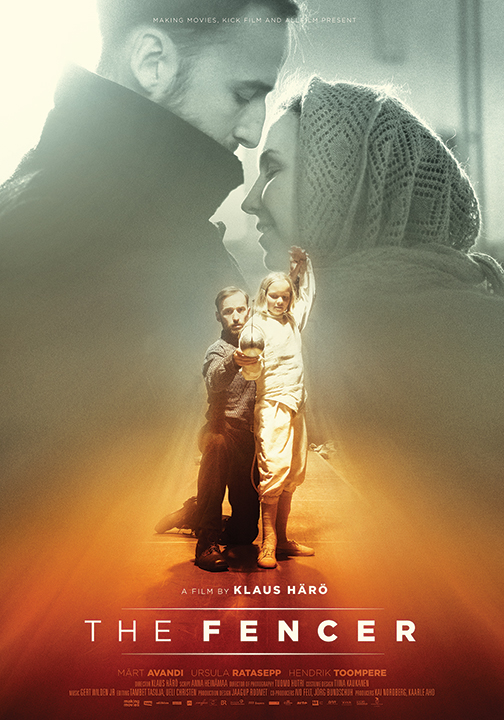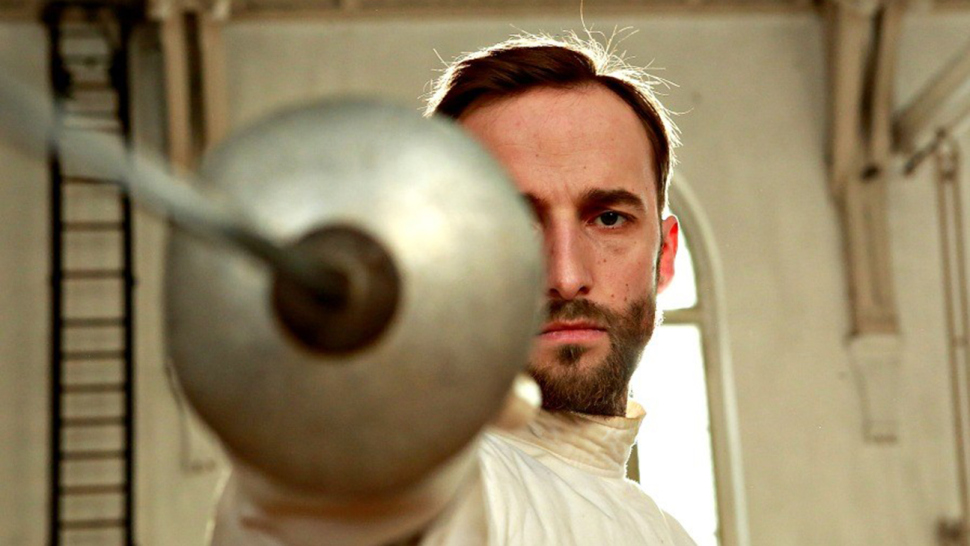Interview: Klaus Härö on Globe Nominee & Oscar Finalist 'The Fencer'
 Saturday, January 2, 2016 at 10:30AM
Saturday, January 2, 2016 at 10:30AM Five of the nine foreign film finalists will become Oscar nominees on January 14th. Here's Jose to talk Finland's Oscar finalist.
 Jose here. Klaus Härö’s The Fencer is based on the real life story of Endel Nelis (Märt Avandi), a fencer who escapes Leningrad in the 1950s, and goes into hiding in the town of Haapsalu, Estonia, where he becomes an essential member of the community when he starts a fencing club. Cherished by children, many of whom need a father figure after being orphaned during the Russian occupation, Nelis is also feared and loathed by others who wish he would return where he came from and leave them alone.
Jose here. Klaus Härö’s The Fencer is based on the real life story of Endel Nelis (Märt Avandi), a fencer who escapes Leningrad in the 1950s, and goes into hiding in the town of Haapsalu, Estonia, where he becomes an essential member of the community when he starts a fencing club. Cherished by children, many of whom need a father figure after being orphaned during the Russian occupation, Nelis is also feared and loathed by others who wish he would return where he came from and leave them alone.
Härö’s film is an example of classic storytelling at its best, using gorgeous cinematography, a lush score and featuring a compelling performance by the swoon worthy Avandi, it’s no surprise that Oscar voters were moved to include it among the entries in the exclusive Foreign Film shortlist. It has also been nominated for a Golden Globe. A couple of weeks before the Oscar announcement was made,
I talked to Härö about his obsession with period films, casting Avandi and awards season. Our interview is after the jump...
JOSE: What surprised you the most when doing your research about Endel Nelis’ life?
KLAUS HÄRÖ: I’ve made the mistake in some previous projects of diving into history, and it’s a bottomless pit. Of course you need a certain research, so I researched the Stalin era in Estonia, and all our makeup artists, costume designers and art directors researched as well, but I decided not to go into Endel’s real life because then you want to edit things. You become fascinated by many things that won’t fit into 90 minutes
JOSE: That’s fascinating because in American films there’s always controversy because people expect history to unfold onscreen exactly like it does in books.
KLAUS HÄRÖ: I feel that controversy, I’m not immune. I’m a Finn, I did a film that takes place in Estonia, let’s say a Swede comes to Finland and wants to make a film about the Winter War, which is almost sacred to Finns, I would ask why? Isn’t there a Finn who can tell this story? Estonians must have felt the same, why is this man coming here to rip our hearts and remind us of this era? All you had to do back then was to disagree with authorities and you would never return home again. There were many stories of people who lost their families, so I wanted to be respectful. Also when you’re making an international co-production, there are at least 20 people commenting on the script. They might all have good ideas, but you can’t include them all, we need to tell a story well. The more you put into the script, the less you take with you when the film is over. American epics like Legends of the Fall and The House of the Spirits, are beautifully made, but you end wondering what they were about. Directors like Zhang Yimou for instance, are great because what they do in their historical epics is they focus on the human experience, and they capture the whole time period. Instead of trying to catch the whole period and end up with nothing of the human emotion.
JOSE: I like how the fact that Endel is in hiding, adds the film a Hitchcockian undertone. What were some of the films that inspired this one?
KLAUS HÄRÖ: Naturally I’m inspired by American classics by Hitchcock and Ford, I remember the quote that says if you can turn your film into a Western, then it’ll make for a good film. Basically test your story, so in ours, we have a new man in town, nobody knows who he is, but it turns out he’s a good guy. There’s also a shootout, bad guys etc. (laughs). I owe a lot to John Ford. What Hitchcock was so good at was the whole “show don’t tell” thing, which I confronted making a film in Estonian/Russian when I don’t speak either language. On TV now we see gore, corpses cut into pieces, but it’s so much more exciting when instead you close the door and don’t let the audience see. You go “uh, oh”, and it keeps you on your toes.
When I get screenplays and decide whether I can commit my next two or three years to a film, I envision the camera moves. With this one, since it’s about a man in hiding, I imagined the camera behind him, following him as he watches everybody, you get a feeling that somebody is watching him.

Mart Avandi has a very classic quality to how he looks. Like an old movie leading man. What were some of the other reasons why you cast him?
He’s a huge star in tiny Estonia, which I didn’t know when I cast him. You can not walk the streets there without someone asking for his autograph. They have no casting agents there, so I sat through endless plays trying to find my leading man, I didn’t know what they were saying, but I believe if you’re touched by what somebody is doing without understanding what they’re saying, it’s good acting. Mart was that kind of guy for me, he had a sadness, a secret to him, something that reminded me of Henry Fonda - who is my favorite actor - or Max Von Sydow. He’s like a beautiful knight with a sad secret.
All of your films so far have been period films, what keeps attracting you to traveling back in time so to speak?
(Laughs) Yeah, before this I made a TV movie set in the present, but nobody saw it. I keep doing period films, I try not to, and then I find myself doing another one. I would say the obvious reason I do them is because they give you the opportunity to tell something visually, the limitations also make for deliberate and cinematic ways of telling stories. Making the TV movie was enjoyable because I had the spontaneity to say “let’s shoot by that bench”, or “nice light, let’s move there”, when you make period films you have to plan and plan, and when your plan fails, then you’re in a tight corner.
Films like The Fencer and The New Man deal with moments in Europe where people’s rights were constantly violated and the system had become completely reactionary. Do you find that in any way some of those elements are returning to European life? Watching The Fencer I obviously found myself thinking about the refugee crisis in Europe.
When you make a period film, you always ask yourself how to make it contemporary, but that is the wrong question, because whenever you tell something true about the human experience - in our film, the need to live in community - it will be timeless and contemporary. Financers will ask you to add modern bookends, which feel forced, there’s no need to try to catch fleeting trends.
The refugees thing is true, but something else that became quite relevant were events in Russia. We were shooting a very emotional scene and I noticed people were on their mobile phones, I began to get a little irritated and said “it’s not Facebook time” and people showed me the news of Russians entering Ukraine. Getting that piece of news changed the energy completely.
 Director Klaus Härö with Liisa Koppel
Director Klaus Härö with Liisa Koppel
This is not the first time that one of your films has been submitted as Finland’s Foreign Language Film entry at the Oscars. Are you used to this by now?
(Laughs) Not at all! The film is made, if I was a swordsman or a musician, I’d decide to focus and put on my best performance, but I’m a filmmaker and my film is done. I have a lot of ideas on how to improve it, but if I came to the producer to ask for money to add more scenes he’d tell me “get outta here!”. It is what it is, but we’re very happy with it. The film was a combination of having the right people, a great screenplay which when I first read it made me think what a gift it would be to make it. I feel that being able to make the film was a gift. It’s embarrassing when they present this film as “my film”, because it’s really “our film”.

P.S. The day after the finalist list was announced, we reached out to Härö who kindly shared this statement via email:
We are really besides ourselves, so happy! Having a hard time believing that we are actually among the nine shortlisted films. But also confident since we have seen people’s reactions in LA & NYC, how warm and true they were. People were genuinely moved by the film! They share the same emotion that I had when I first read the script: that it is a privilege to go to the beautiful journey where this film takes us.
The film doesn't yet have an American distributor, but New Yorkers can see The Fencer on 01/20 at a screening at Scandinavia House part of their Nordic Oscar Contender Series. All previous 2015 foreign film coverage.
 Finland,
Finland,  Klaus Härö,
Klaus Härö,  The Fencer,
The Fencer,  foreign films,
foreign films,  interview
interview 




Reader Comments (2)
Thanks Jose for your great coverage of the FLF race :)
Wow-- wonderful interview! Surprised there is still a vacancy regarding American distribution; hopefully, this will be resolved in the near future.